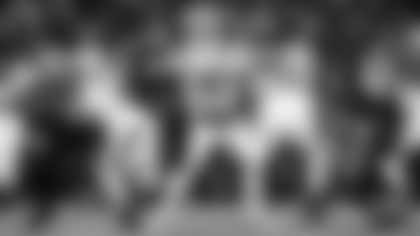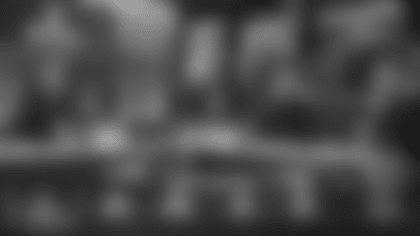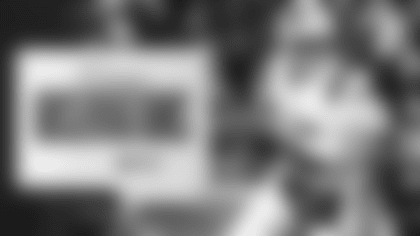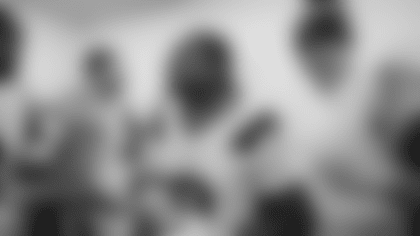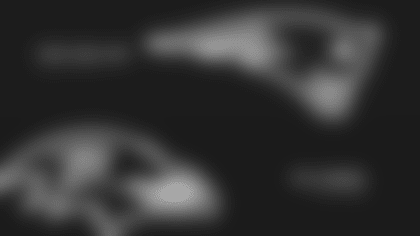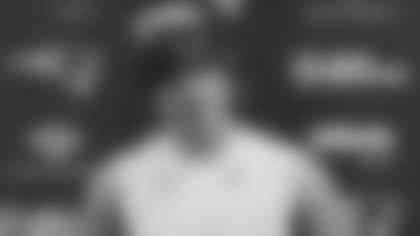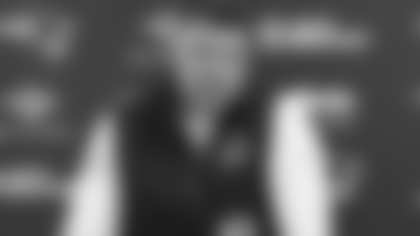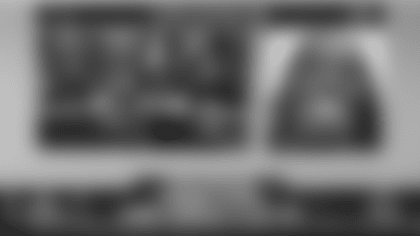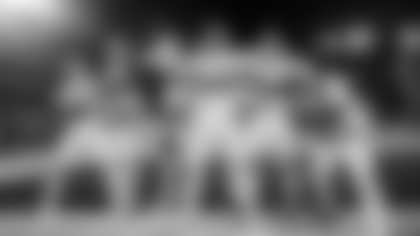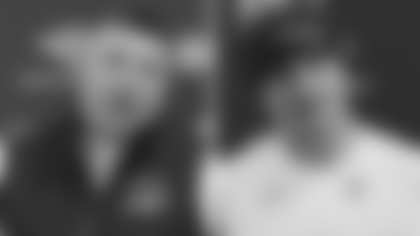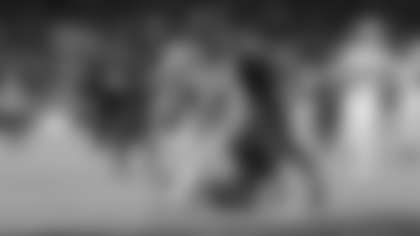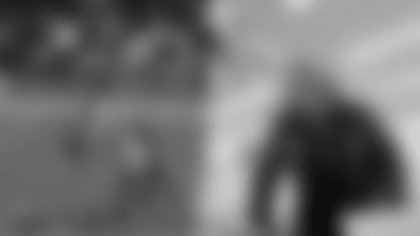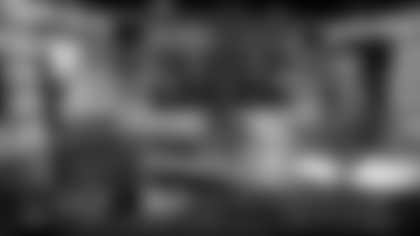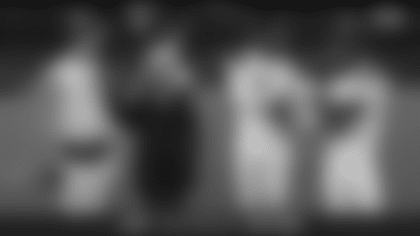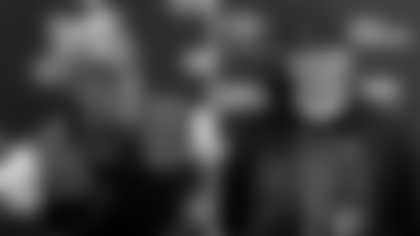BP: I'll say, I'm very flattered I would be considered with both Drew [Bledsoe] and Houston Antwine. It's quite a surprise to me, but I'm very flattered to be in that group, and [I] have very fond memories of my two times that I worked in New England there. I have a home just a little west of there as you know, so I've always liked that part of the country very much.
Q: Why do you say that this is a surprise to you?
BP: I don't know. First of all, I really didn't know much about this. I didn't really know that this was in existence at the Patriots. And Stacey [James] was kind enough to call me and tell me about it, so it was a surprise in that matter of speaking. I really just wasn't familiar that they had something like this going on.
Q: When you think back to the second stint in New England (1993-96), how do you remember that?
BP: Well, I remember going there, and in all honesty, the franchise was in, I don't want to use the word disarray, but it certainly was unsettled. That would be the best way to put it. The ownership was unsettled. There were not a lot of people going to the games. The management of the franchise was unsettled. And it was a big undertaking, but I do feel like when Robert Kraft took over the team, that was really a major step for stability for the franchise and for the Patriots themselves. And of course, now it's one of the premier franchises, top three or four in the league, no doubt. And just look what's happened in 15 years or 16 years from then to now. It's gone from being a place that didn't have very good facilities to having the best. The team wasn't great, and now it's certainly a premier team. Bill Belichick has done a tremendous job there, remarkable job. And just it's a model for the teams in the league that are aspiring to do what the Patriots have already done. I don't really think I had a whole lot to do with that, but I think the one thing I would say that was helpful is we were able to, during the course of my time there, put, I'll name a few guys because I was just thinking about what I was going to say. Besides the obvious Drew Bledsoe, [Willie] McGinest, Ty Law, Lawyer Milloy, Troy Brown, Tedy Bruschi, Curtis Martin, Adam Vinatieri, Terry Glenn. We were able to put those players on the team to go with Ben Coates and [Bruce] Armstrong and Sam Gash and say Maurice Hurst was a good little player that were already there. And I think that was the beginning of some personnel continuity. And some of those kids have gone on to be, as you know, some of the great players in Patriots history. And so, I do get a sense of accomplishment in that because there are some real quality players there that made a significant contribution to the development of the franchise.
Q: Have you been back to Foxboro within the past five years or so?
BP: I came back to coach there once with the Cowboys is the only time, I think it was a Sunday night or a Monday night game. It was the only time that I've been in that facility. Of course you know my daughter was there for a number of years, so I've been in the proximity a couple of times since then. And I do visit some friends in New England during the summertime.
Q: Have you had a chance to see the development around the stadium and with that The Hall at Patriot Place and the way the franchise is working to honor its former players and coaches?
BP: No, I really haven't had that chance to go in and see it first hand. I really haven't had a chance to do that. I knew that was in play and it was starting to develop, but I really couldn't tell you that I know what it looks like or have really actually seen it, no.
Q: When you came on board in 1993, I think a lot of what has come to pass has been almost unthinkable. Even at the end of your first season, people were sweating it out and wondering if the team was going to be playing in St. Louis. I like to think that the sense of organization that you brought to the franchise has really had a lot to do with putting down the cornerstones for building something that as you can see has endured now. I know you probably don't want to take credit for any of it, but when you look back at just how close the franchise was to not even being here, what are your thoughts about that?
BP: There was a lot to do. Coincidently, I knew some of the people who were working there because I had been there before, and I had a relationship with them, some of the support staff. So that was of help to me just coming in and having a few people that I knew and I could talk to, particularly when Bucko [Kilroy] was still alive. Bucko and I had a very good, long-standing personal relationship going back to when I first met him in 1980. And he was always a good friend to me. And he was very very helpful in kind of telling me, 'Bill, we need to get some stability here and get some things in order.' I had really been taught, my background basically in professional football came from the New England Patriots with Bucko and Mike Holovak, who really are the ones who taught me the scouting system, the personnel evaluation system, and the things that I used my entire career, with also a little help from Al Davis and my longtime friend Ron Wolf. Those are the four major guys that really I say enabled me to develop a philosophy to put in place. I give a lot of credit to Bucko and Mike Holovak and of course Al and Ron because those are the people I consulted with the most, particularly on the personnel and the scouting and getting a philosophy in place and try to adhere to your principles, and try to look for certain kinds of players and those kind of things that were very very important. In that respect my background really is based on my experience in New England.
Q: Talk to us about being the mentor of Patriots Hall of Fame nominee Drew Bledsoe not just when you picked him first overall in 1993 and coached him in New England, but also in Dallas when you brought him in to sure up the quarterback situation in Dallas.
BP: Well, as you may remember, the two top quarterbacks were Rick Mirer and Drew Bledsoe. Drew was a young man, 20 years old at the time, coming out from Washington State. He had been a terrific passer in the Pac-10. Rick Mirer of course was at Notre Dame, the level of competition just a little bit better, but he was 23 years old. And a lot of my thought process and our thought process in the scouting there was, 'Well, Drew can make all the throws and he's a little bit younger and certainly not as mature as Mirer, but where is he going to be when he's 23 years old? And he's got a three year window to certainly get pro football into his system and learn about it.' Of course, I personally was very happy that we picked him. And he really had a very very good career and came in and really helped get the franchise established. He really was thrown to the wolves a little bit, and he survived that and was able to get himself grounded and did a terrific job for New England for a long time. That was really one of the key pieces, and with some of these other young guys that I mentioned. A couple of them like Adam Vinatieri, we just stumbled on. A friend of mine was coaching in Europe and Adam had only kicked 10 field goals and he had made nine of them, and we just kind of found out about him by good fortune. Same with Troy Brown, who had a stellar career for New England. Jim Donnan is a long time friend of mine at Marshall, he called me up and said, 'Bill, you need to come down and look at this guy.' And we did, and sure enough wound up taking Troy and he did great for us, too. Sometimes, you just get lucky as well.
Q: We know that you do well with helping franchise like you did with New England and more recently with Miami, are you done as far as the NFL or do you have other ventures in you?
BP: No, I'm done. I know I've said that before, so you better put it down in pencil. My full intention is, I'm going to be 70 years old in August, and I'm enjoying my time now. This is the first...you know I really left Miami about October 1 last year, and it is really the first time I've had any extended period of time to myself, and you get to do some things that I enjoy doing. I have a place in Saratoga, N.Y. that I like very much. And I'm currently speaking to you from Jupiter, Florida, which I've been here since in the mid-80s, and I love it here. So, it's a good time for me. And fortunately, I'm in good health and feel good. I still have a lot of things that I'd like to try to do, but I think I'm going to leave the NFL somewhere else now.
Q: When you look back at the second stint in New England, 1993-96, what regrets might you have when you look back at that time?
BP: Well, as you know I had some, let's say we had a couple domestic misunderstandings with the ownership. I do regret that. Those things have since been resolved. I think retrospectively, I would've handled things substantially differently than I did. And, I was always saddened by the fact that I had to leave there, and in all honesty, didn't really want to. And I'm sure Bob [Kraft] would say something along those lines himself because we have talked about that. So, I left I thought a pretty good team there. We had just been to the Super Bowl, and it was a very young team. Now, we needed some more help. It wasn't a finished product by any stretch of the imagination, but we were on the way up. I don't think there was any question about that. And we needed a little help defensively, and maybe another offensive lineman or two. But we had the skill people, and some of the defensive pressure players in place. So, I did regret that. Hey, that's life, and you learn from things as you go on, and certainly, I probably retrospectively, would've approached it a little differently than what I did.
Q: Are you currently following what is going on with the NFL and the lockout from afar and wondering what is going to happen next year?
BP: Yes, I am paying attention. This would've been my fourth, what you would call labor dispute. Quite frankly, and this is not to be sarcastic at all, I hear a lot of the same rhetoric that I heard back in '82 and '87. It's just different people saying it. But, I'm like anyone who loves the game, and I do love the game, we're all hopeful that this is resolved. But I do understand, I think, some of the positions, certainly the ownerships' position, I do understand, I think. And having really been in a management position for a while, [I] understand the economics of this game now. And I can appreciate the players, too, and what they're trying to do and the union. But at the end of the day, we have a wonderful venue here. America is very interested in it. It's extremely popular. It's been good to all of us who have been in it or certainly, the vast majority of us that have been in it. And I'm just hopeful that it comes to a quick and good resolution because it is a very big part of the American sport landscape. I'd be sad if we were to start missing a lot of games.
Q: I know you're going to be doing a little bit of analysis for ESPN in the draft upcoming. You've been in broadcast booths before. Do you ever get the urge to make it a little bit more permanent or are you just enjoying life on your own terms right now?
BP: Actually right now, I have done this draft show for ESPN. It's going to air on the 26th, Tuesday night at 9 p.m., right prior to the draft. We are talking a little bit. They've been very good to me. I've worked for them a couple of times before. They've really been extremely good to me and extremely flexible with me in terms of discussing possibilities, and actually we are talking a little bit now about some possibilities. But we haven't resolved anything yet. But I'm certain that we will in some manner of speaking. As I said, I've enjoyed being there with the people on ESPN a couple of times before. We haven't gotten anything settled yet, but I think there is a good chance that something might work out. I'm not sure.
Q: A draft-related question for you in your role as an executive and consultant. When you have quarterbacks like Tom Brady or Peyton Manning, when's the point when you think about going into the draft and looking for their future replacement?
BP: Well, you know, that's a good question. I think you have a constant vigil to try to maintain continuity at that position because it is the premier position in the league. And it's vital. These players are up in their 30s, and they both seem to be very well-conditioned, very durable, very committed players. I think the future is certainly part of what the Patriots and the Colts will be relying on from those players. But, that being said, I think anytime you get into your 30s or mid 30s like they're approaching or currently in, you have to start thinking about it a little bit because you go out there one Sunday and it can be over pretty quickly or your skills can deteriorate pretty quickly. I think it would be in the back of both teams' minds now. You know, 'Hey, maybe we ought to think about doing something here.'
Q: Bill, your time in New England and your time in the Jets were pretty similar in that you picked up two teams that were down on their luck and enveloped in losing cultures. Which was the bigger challenge for you when you stepped in?
BP: I think New England was bigger because there was a lot more stability at the Jets. Ownership was more stable at the Jets. The talent level initially when I went to the Jets was much better. So, I would say that New England was a bigger undertaking because the franchise was in...there were a lot more areas that lacked structure and stability.
Q: You've already credited Bill Belichick with the way he's helped advance this Patriots franchise. Where you would rank him among the all-time coaching greats?
BP: There's no dispute in that. Just put him right up there at the top of the conversation with what he's done. There's no doubt about it. I think he's done a remarkable job. So, you can put his name up there with anybody who has ever done it.
Q: When you mentioned retrospectively looking back that you were saddened that you had to leave, when did you get that closure? How did it come about that you were able to reconnect with Bob Kraft to talk about the way things ended and share both of your thoughts on that chapter in your lives?
BP: I don't know if there was any definitive time. We just kind of ran into each other a few times. You can't help but talk things over a little bit. We haven't ever had a lengthy conversation about it, but I'm not speaking for him. I really am not. I just think that both of us know, and certainly I know, I can speak for myself, I would've probably handled things differently. And I don't know what he would say about that.
Q: A question on Bill Belichick. His departure from New York was a little messy when he came to New England. Did you and he ever have a resolution of any hard feelings because it seems that you are square now and fine with each other?
BP: We definitely are. Actually, he has a condo, two condos above me in the same building in Florida. So we see each other from time to time. And we've had many conversations over the years. Hey, we worked together for a very very long time. We were in the same office together for 10 years. You can't just dismiss things like that. So he was a big help to me when we were both assistant coaches together, and then when I was the head coach, he was a vital part of our organization. Ultimately, I've been a help to him at some point. Certainly, he got an opportunity there at New England and was able to do a terrific job. He's a great coach. We get along just fine.
Q: What are your thoughts on the mark you have left on the NFL whether it's players that you've drafted or individuals from your coaching tree that have gone on to lead teams to the Super Bowl. What are your thoughts on being part of NFL history?
BP: Well, that's a difficult question. I feel like if someone would say something positive about Bill Parcells, I would hope it would be that 'he had a lot of respect for the game and his predecessors. If he did leave any mark on the NFL, it would certainly be those to follow.' That's what I would hope. I've said many times, we're all riding a train. And it's a great ride when you're on it, but they ask you get off, everybody has to get off the train, and that time comes, you're just hopeful that there is no heartbreak with it because there can be, but in my case, there never was, so I was very fortunate in that regard. I would like to say one thing about one of other nominees: Houston Antwine. I saw him play quite a bit, and I thought he was really really a tremendous player. Tremendous player. And he's one of those guys that I don't think ever got a lot of notoriety, but I can tell you firsthand, he was terrific. I did want to mention that.
Q: What were some of your favorite stops between 1993 and 1996? I remember hearing you used to stop at a doughnut shop every morning. Can you take us back to that time of your life and some of the things you appreciated about being in that Foxboro area?
BP: That's not exactly a culture shock going from Jersey to Massachusetts. We have a lot of the same kind of things going on. There's always a coffee stop. There's always people yelling at you on the streets or talking to you, initiating conversations. It's a very passionate sports environment, and when people see you, they want to know something. I always enjoyed that part of it. You get to know some of the people that are working for a living right around in proximity to the stadium because you're either stopping for gas or you're stopping for coffee or in those days, I was probably stopping for doughnuts. I don't do that anymore. But, other than that, people in the proximity, you just get to know them. And, they befriend you in their own way. Or going to the restaurants in the area both in Boston and in Providence. It's a great environment if you're in sports, particularly if things are going okay.
BP: I appreciate the nomination very much. Say hello to all the people in New England that have befriended me over the years and the many friends I have there. Thank you.


